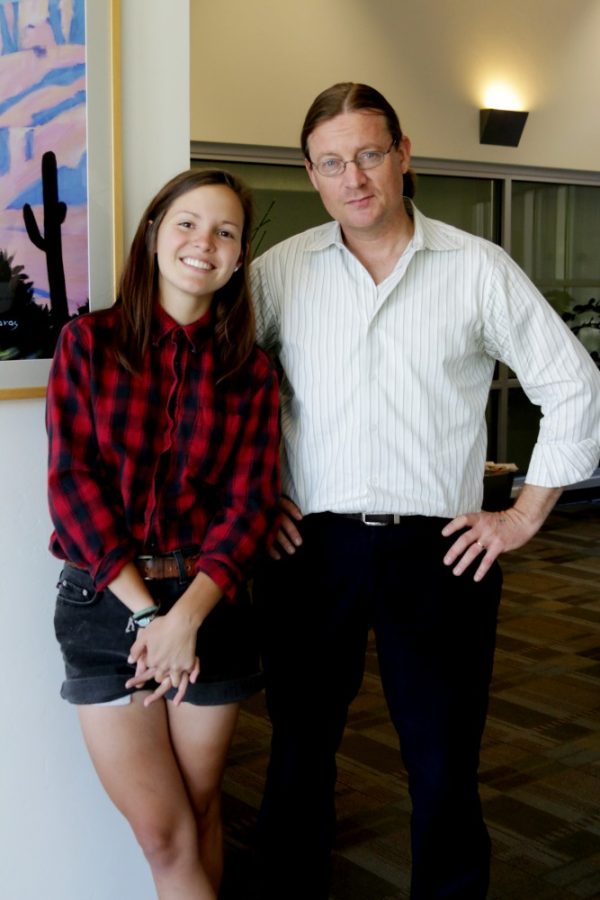Last week, the Environmental Protection Agency recognized the Associated Students of the University of Arizona club, Compost Cats, for its work in composting. This is the first time the Compost Cats have been recognized for the work they entered in the EPA’s annual Food Recovery Challenge.
The Compost Cats submit data about their composting efforts to an online register with the EPA every year. Other universities and composting organizations submit their data as well, and from all of these submissions, the EPA gives the top programs special recognition for their work, according to Benjamin Champion, the director of the Office of Sustainability.
This year, the Compost Cats were recognized for their data from 2015.
“It’s an honor to be recognized by the EPA,” Champion said.
This recognition puts the spotlight on the partnership and student leadership that the Compost Cats pride themselves on.
The club, an ASUA Students for Sustainability program, started five years ago and has since grown into an organization that counts compost for the Arizona Student Unions, with the San Javier Co-op Farm and the City of Tucson Environmental Services as partners, according to Chet Phillips, the Compost Cats’ project director and the ASUA sustainability coordinator.
“This is a project that began with a student idea and has all along been largely student-operated, student-directed. I was a grad student when I helped get it going,” Phillips said. “We would never have never have gotten to where we are, having composted 10 and a half million pounds of material that would have otherwise gone to landfill, without our partners.”
The development of the Compost Cats into the organization it is today first started with the Student Union allowing the club to collect food scraps, which they then composted at the UA Campus Agricultural Center. From there, they moved their composting operations to the San Javier Co-op Farm, which allows the Compost Cats to work on their compost in exchange for 20 percent of the finished compost, which is then used to grow the crops on the farm.
“We met a need for each other,” Phillips said. “They were interested in having large amount of compost, but didn’t really have the labor and the money to kind of get that started and everything, and we really needed a larger area of land. We’ve had a wonderful relationship with San Javier and look forward to that for years to come.”
It was the Compost Cats’ partnership with the City of Tucson that allowed them to greatly increase the amount of material they composted.
In July 2014, the City of Tucson started partnering in full with the Compost Cats by collecting organic materials from restaurants and grocery stores around town, which allowed the program to expand more because the city could pick up the compost more efficiently than the club could, according to Phillips.
“We used to go around in a state truck and go take bins full of food waste from all these restaurants,” said Taylor Sanders, a sustainable plant systems senior and the sales and development manager of the Compost Cats. “We used to go on runs that would be like four hours long, driving all around town. It was super inefficient, so that’s why we converted into using the city instead.”
The Compost Cats now have an intergovernmental agreement with the City of Tucson, Phillips said.
“You’re talking about a student idea that has become the City of Tucson’s compost program and is still student-operated in terms of the actual composting end of things,” he said.
With this partnership, the amount of material the Compost Cats were able to compost grew, with an increase of 1,200 percent from one year to the next, according to Phillips.
This kind of growth is just the beginning. Sanders said she hopes to see the Compost Cats expand more to keep up with large-scale farms in Southern Arizona, as well as starting a program to educate people about food waste.
The club has already started working toward this goal by working with waste reduction education in three different schools in the Amphitheater School District where it gathers food scraps for compost. Compost Cats also plans to bring this type of program to six schools in the Tucson School District by the end of the school year.
“We’re interested in building a minimum waste culture in Southern Arizona and so really in terms of our future, I think doing more in local public school is a big part of that,” Phillips said.
For Champion, recognition by the EPA could also help with changing campus culture by raising awareness of sustainability initiatives such as Compost Cats.
“The kind of recognition that we get that kind of infiltrates our culture to a degree and people begin to think differently about food waste and start to ask questions like ‘why we should have more composting options on campus,’” Champion said. “It’s all part of it. Awareness is clearly a key need if we’re going to advance in any sustainability efforts.”
For Sanders, the awareness that recognition brings extends beyond just the UA. She hopes that programs like this can take other areas by storm.
“We’re definitely looking forward to being recognized on a nationwide scale,” she said. “This is something that it could very well happen at a lot of universities around the nation because we’re relatively urban, and there’s a lot more universities that are rural that have farmland right across the street from them.”
Follow Ava Garcia on Twitter.








